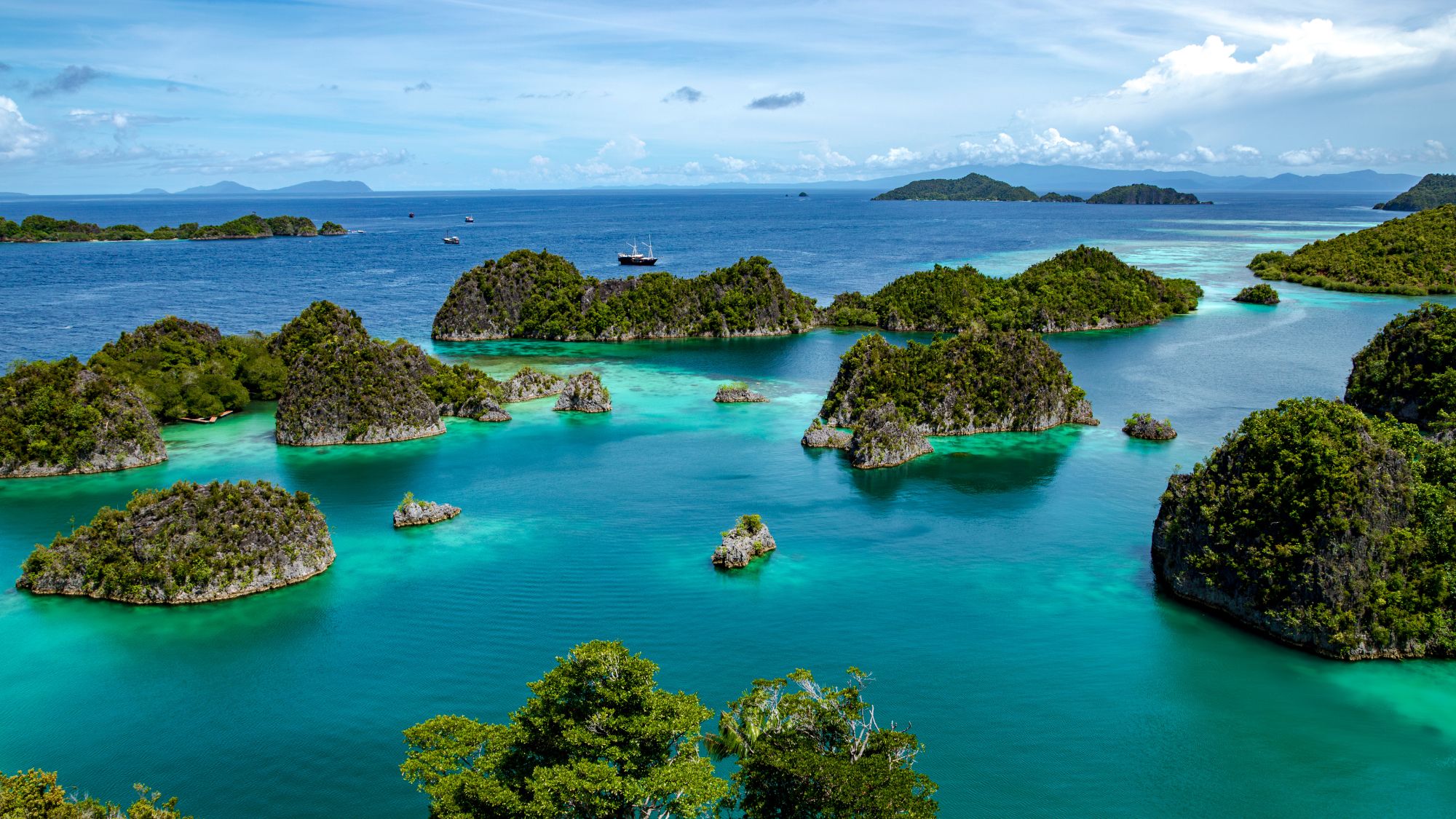The dazzling coral gardens of Raja Ampat
Region of Indonesia is home to perhaps the planet’s most photogenic archipelago

A free daily email with the biggest news stories of the day – and the best features from TheWeek.com
You are now subscribed
Your newsletter sign-up was successful
With its jungly karst islands, like dozens of bright green button mushrooms scattered across turquoise seas, Raja Ampat is perhaps the planet’s most photogenic archipelago.
And this “otherworldly” region of eastern Indonesia is also home to what is thought to be the most biodiverse marine system on Earth, said Lorna Parkes in National Geographic Traveller. Roughly 75% of the world’s hard coral species are found here, and these “forests of the ocean” support more than 1,500 fish species, at least 18 mammal species, and six out of the world’s seven species of sea turtle. For snorkellers and divers it is nirvana, and there’s no lovelier way to explore it than aboard a pinisi, a traditional wooden sailing boat. I went on a five-day trip with Rascal Voyages, a company that owns two specially adapted pinisi in which the five cabins are above deck, with wraparound views. (The boats have no sails, as a result.)
Our ship, the Rebel, is comfortable, “all polished woods, big picture windows and comfy palm-print cushions”, with an air- conditioned bar where marine biologists deliver lectures. There’s also a presentation by the charity Sea People, which helps to repair damage to Raja Ampat’s coral reefs caused by warming seas and unsustainable development.
The Week
Escape your echo chamber. Get the facts behind the news, plus analysis from multiple perspectives.

Sign up for The Week's Free Newsletters
From our morning news briefing to a weekly Good News Newsletter, get the best of The Week delivered directly to your inbox.
From our morning news briefing to a weekly Good News Newsletter, get the best of The Week delivered directly to your inbox.
Guests who can confidently control their buoyancy while diving can join in its “coral gardening” work, which involves transplanting tens of thousands of coral fragments from healthy sites. I stuck to snorkelling, but still saw many wonders, from clouds of colourful fish to hawksbill turtles, huge manta rays and even an epaulette, a “walking shark” that crawls over the reef using its fins. Scarcely less heavenly were our trips on land.
While birdwatching in Waisilip Bay, we saw sea eagles and cockatoos, though we missed the dazzling birds of paradise for which the region is known. And at Kali Biru, we floated downstream beneath “an arcade of jungle creepers”, on a river of the bluest water imaginable.
Cabins cost from £1,880 full board; rascalvoyages.com
A free daily email with the biggest news stories of the day – and the best features from TheWeek.com
-
 The environmental cost of GLP-1s
The environmental cost of GLP-1sThe explainer Producing the drugs is a dirty process
-
 Nuuk becomes ground zero for Greenland’s diplomatic straits
Nuuk becomes ground zero for Greenland’s diplomatic straitsIN THE SPOTLIGHT A flurry of new consular activity in Nuuk shows how important Greenland has become to Europeans’ anxiety about American imperialism
-
 ‘This is something that happens all too often’
‘This is something that happens all too often’Instant Opinion Opinion, comment and editorials of the day
-
 Arcadia: Tom Stoppard’s ‘masterpiece’ makes a ‘triumphant’ return
Arcadia: Tom Stoppard’s ‘masterpiece’ makes a ‘triumphant’ returnThe Week Recommends Carrie Cracknell’s revival at the Old Vic ‘grips like a thriller’
-
 My Father’s Shadow: a ‘magically nimble’ love letter to Lagos
My Father’s Shadow: a ‘magically nimble’ love letter to LagosThe Week Recommends Akinola Davies Jr’s touching and ‘tender’ tale of two brothers in 1990s Nigeria
-
 Send Help: Sam Raimi’s ‘compelling’ plane-crash survival thriller
Send Help: Sam Raimi’s ‘compelling’ plane-crash survival thrillerThe Week Recommends Rachel McAdams stars as an office worker who gets stranded on a desert island with her boss
-
 Book reviews: ‘Hated by All the Right People: Tucker Carlson and the Unraveling of the Conservative Mind’ and ‘Football’
Book reviews: ‘Hated by All the Right People: Tucker Carlson and the Unraveling of the Conservative Mind’ and ‘Football’Feature A right-wing pundit’s transformations and a closer look at one of America’s favorite sports
-
 Catherine O'Hara: The madcap actress who sparkled on ‘SCTV’ and ‘Schitt’s Creek’
Catherine O'Hara: The madcap actress who sparkled on ‘SCTV’ and ‘Schitt’s Creek’Feature O'Hara cracked up audiences for more than 50 years
-
 6 gorgeous homes in warm climes
6 gorgeous homes in warm climesFeature Featuring a Spanish Revival in Tucson and Richard Neutra-designed modernist home in Los Angeles
-
 Touring the vineyards of southern Bolivia
Touring the vineyards of southern BoliviaThe Week Recommends Strongly reminiscent of Andalusia, these vineyards cut deep into the country’s southwest
-
 Nan Goldin: The Ballad of Sexual Dependency – an ‘engrossing’ exhibition
Nan Goldin: The Ballad of Sexual Dependency – an ‘engrossing’ exhibitionThe Week Recommends All 126 images from the American photographer’s ‘influential’ photobook have come to the UK for the first time